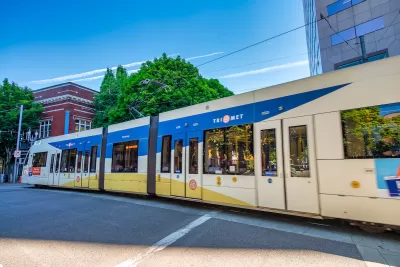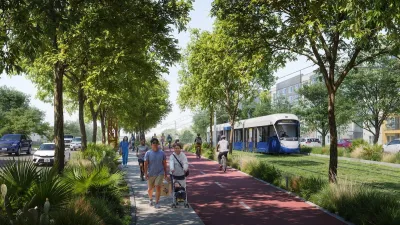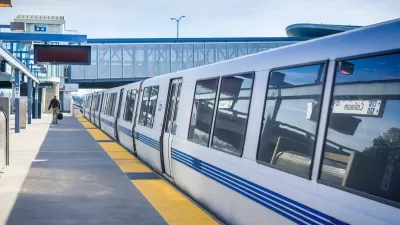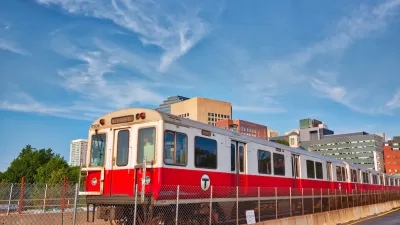When temperatures hit 100 degrees, the city’s two train systems face challenges that force them to slow their speeds or stop operations altogether.

Portland’s MAX trains must slow down after temperatures hit 100 degrees, reports Anthony Macuk for KGW.
According to Macuk, “TriMet has upgraded the system in recent years to maintain full speed at higher temperatures, but there's still an upper limit.” After 100 degrees, MAX trains will slow down to a top speed of 35 miles per hour, while WES trains will top out at 40 mph.
At 105 degrees, the WES trains stop running. If temperatures get that high, TriMet may adjust or suspend service on MAX trains, but that decision is made based on conditions throughout the system and out of consideration for the safety of riders and employees.
As Macuk explains, “MAX trains are powered by overhead wires, which have to be kept taut so the train's pantograph arm can maintain steady contact. But the wires are made of copper, which expands when heated and can cause sagging.” If the sagging causes the lines to sink too low, trains have to slow down or stop entirely.
WES trains face a different problem, one that could impact Amtrak and other train systems as well. “TriMet's WES trains are diesel-powered and run on Portland & Western freight rail tracks with no overhead wires, but they can still get tripped up by heat waves because the high temperatures can also cause the steel rails to expand and temporarily deform — a phenomenon called ‘sun kinks’ — making it unsafe to drive trains over them at full speed.”
FULL STORY: Yes, TriMet MAX trains have to slow down when it's very hot out

Planetizen Federal Action Tracker
A weekly monitor of how Trump’s orders and actions are impacting planners and planning in America.

Map: Where Senate Republicans Want to Sell Your Public Lands
For public land advocates, the Senate Republicans’ proposal to sell millions of acres of public land in the West is “the biggest fight of their careers.”

Restaurant Patios Were a Pandemic Win — Why Were They so Hard to Keep?
Social distancing requirements and changes in travel patterns prompted cities to pilot new uses for street and sidewalk space. Then it got complicated.

Platform Pilsner: Vancouver Transit Agency Releases... a Beer?
TransLink will receive a portion of every sale of the four-pack.

Toronto Weighs Cheaper Transit, Parking Hikes for Major Events
Special event rates would take effect during large festivals, sports games and concerts to ‘discourage driving, manage congestion and free up space for transit.”

Berlin to Consider Car-Free Zone Larger Than Manhattan
The area bound by the 22-mile Ringbahn would still allow 12 uses of a private automobile per year per person, and several other exemptions.
Urban Design for Planners 1: Software Tools
This six-course series explores essential urban design concepts using open source software and equips planners with the tools they need to participate fully in the urban design process.
Planning for Universal Design
Learn the tools for implementing Universal Design in planning regulations.
Heyer Gruel & Associates PA
JM Goldson LLC
Custer County Colorado
City of Camden Redevelopment Agency
City of Astoria
Transportation Research & Education Center (TREC) at Portland State University
Camden Redevelopment Agency
City of Claremont
Municipality of Princeton (NJ)





























